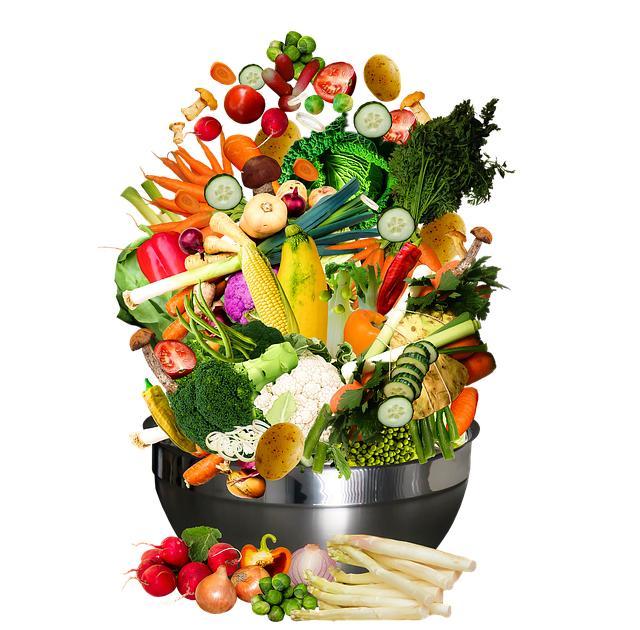In a world brimming with culinary temptations and a whirlwind of dietary advice, making smarter food choices can feel like navigating a labyrinth with ever-shifting walls. Each day presents a new opportunity to nourish our bodies and minds, yet the path to optimal health often seems obscured by the allure of quick fixes and convenience. Imagine transforming your daily eating habits into a mindful journey, where each meal becomes a deliberate step toward a healthier, more vibrant you. This article delves into the art of making smarter food choices, offering insights and practical tips to empower you on this delicious journey of discovery and well-being. Whether you’re a seasoned foodie or just beginning to explore the world of nutrition, these strategies will help illuminate your path to a more conscious and fulfilling relationship with food.
Mindful Eating for a Healthier You
Making smarter food choices is an essential aspect of embracing a healthier lifestyle. By adopting mindful eating habits, you can enhance your relationship with food and nourish your body more effectively. Here are some practical tips to help guide you on this journey:
- Listen to Your Body: Pay attention to your hunger cues and eat only when you’re truly hungry. Avoid eating out of boredom or emotional distress.
- Prioritize Whole Foods: Choose fresh, unprocessed foods whenever possible. Whole grains, fruits, vegetables, lean proteins, and healthy fats should be the foundation of your diet.
- Portion Control: Be mindful of portion sizes. Use smaller plates and bowls to help regulate the amount you eat, and try to savor each bite.
- Plan Ahead: Prepare meals and snacks in advance to avoid impulsive, unhealthy choices. Keep nutritious options readily available.
By integrating these mindful eating strategies into your daily routine, you can make more informed food choices that contribute to your overall well-being. Remember, it’s about progress, not perfection, so take it one meal at a time.

Decoding Nutrition Labels with Confidence
Understanding the intricate details on a nutrition label can transform your grocery shopping experience from overwhelming to empowering. At a glance, you can identify key elements that contribute to a balanced diet. Start by focusing on the serving size and the number of servings per container. These figures help in calculating the actual nutrient intake. Next, examine the calories per serving, ensuring it aligns with your daily caloric needs. Keep an eye on the percent daily values (%DV), which indicate how much a nutrient in a serving of food contributes to a daily diet. A %DV of 5% or less is considered low, while 20% or more is high.
- Fats: Prioritize unsaturated fats over saturated and trans fats for heart health.
- Sugars: Aim for products with minimal added sugars to maintain energy levels and avoid spikes.
- Sodium: Opt for lower sodium options to support cardiovascular health.
- Fiber: High-fiber foods are beneficial for digestion and satiety.
- Proteins: Ensure adequate protein intake for muscle maintenance and repair.
By focusing on these components, you can make informed choices that support your health goals without getting lost in the sea of numbers and percentages. Remember, the simpler the ingredient list, the better it often is for your body.

Harnessing the Power of Meal Planning
Imagine opening your fridge to find a well-organized array of ingredients, each one purposefully selected to align with your nutritional goals. Meal planning can transform this vision into reality, helping you make informed decisions without the stress of last-minute scrambles. By dedicating a small amount of time each week to plan your meals, you can curate a menu that not only satisfies your taste buds but also supports your health. The art of meal planning involves considering your dietary needs, seasonal produce, and budget, which collectively guide you toward smarter food choices.
- Set clear goals: Identify your dietary objectives, whether it’s reducing sugar intake or increasing protein consumption.
- Embrace variety: Incorporate a diverse range of fruits, vegetables, grains, and proteins to ensure balanced nutrition.
- Be flexible: Allow room for spontaneity, leaving one or two meals unplanned to accommodate cravings or social events.
- Optimize leftovers: Plan meals that can be transformed into new dishes, minimizing waste and maximizing convenience.

Sustainable Swaps for Everyday Meals
Transforming your daily meals into eco-friendly feasts can be both delicious and rewarding. Start by making mindful substitutions that not only benefit the planet but also enhance your culinary experience. Consider these simple yet impactful swaps:
- Plant-Based Proteins: Replace beef or pork with lentils, chickpeas, or tofu. These options are not only rich in protein but also have a lower carbon footprint.
- Whole Grains: Swap refined grains like white rice or pasta for their whole-grain counterparts such as quinoa or barley. These alternatives are more nutritious and sustainable.
- Seasonal Produce: Choose fruits and vegetables that are in season locally. This reduces the need for long-distance transportation and supports local farmers.
By incorporating these changes into your meals, you contribute to a healthier planet and a more diverse diet. Remember, every small change counts towards a larger impact.
Insights and Conclusions
As you embark on your journey toward making smarter food choices every day, remember that each decision is a step toward a healthier and more mindful lifestyle. Embrace the power of knowledge, savor the diversity of flavors, and let your plate be a canvas of vibrant, nourishing options. It’s not about perfection but progress—small, consistent changes that honor your well-being and reflect your unique tastes. So, as you navigate the aisles, dine with friends, or cook up a storm in your kitchen, let these insights guide you. Here’s to a lifetime of delicious discoveries and the joy of eating well, one bite at a time.


































